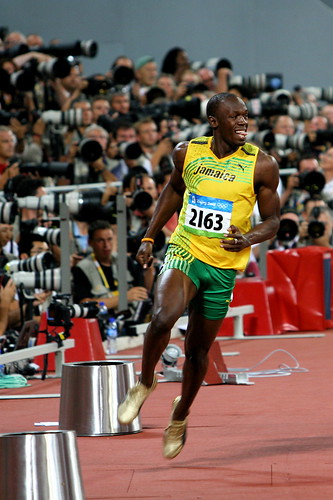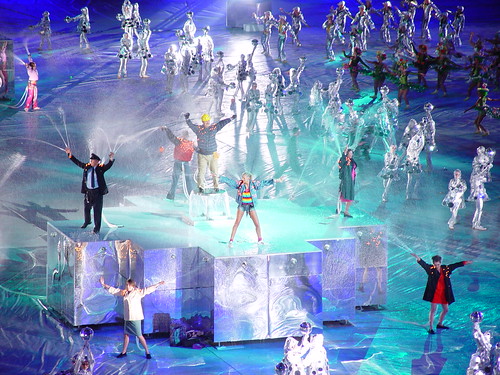Well, I thought the London 2012 segment of the closing ceremony was… OK.
The whole bus stop routine was underwhelming, and the presence of David Beckham seemed a bit random, but the moment when the bus opened up like a flower was a striking image, as was Leona Lewis raising up into the air with her frilly dress trailing down behind her. And while Led Zep isn’t my kind of music — or indeed remotely contemporary, by pop standards — it did just about manage to cut through the slightly oppressive grandiosity of the Chinese ceremony. So I’ll give it a solid 6½/10. For the London opening ceremony they need to bring that up to at least 8½, but for the time being I can live with that.

My sporting highlight of the games was Usain Bolt. No points for originality there. I know I said the other day that the sprint events were overrated, but for once they really lived up the hype. Watching someone beat the field by such a large margin and apparently so easily was almost surreal. It just shouldn’t be possible to do that.
I suppose I ought to name-check Michael Phelps, although as all his races were on in the middle of the night, I never really engaged with his story in the same way. Is he now The Greatest Olympian Ever? Well, I suppose he might be. It’s not that he won 8 medals in Beijing: sure, that’s incredible, but I still think the greatest individual achievement at a single Games was Emil Zátopek winning the 5000m, 10000m and marathon in 1952. But if you add the five golds from Athens, Phelps has completely dominated the swimming at two Olympics now, and that might be enough to secure his place as The Greatest. Apparently he’s planning to compete in 2012: if he could come to London and win another three or four golds, that really would put him in a class of his own.
Speaking of Zatopek: OMG, the Ethiopians in the long-distance running. To have Tirunesh Dibaba and Kenenisa Bekele both manage the 5000/10000 double was amazing. And particularly the women’s 10k and the men’s 5k; to see them sprint so easily away from the rest of the field at the end of a very fast-run race was almost as impressive in its way as Usain Bolt in the sprints. Bekele ran the last mile in under four minutes; I know the four-minute mile isn’t a big deal any more to a professional athlete, but to run one at the end of a fast 5000m… lawks.
And there’s Britain coming in fourth place on the medals table. Fourth! In Atlanta we came 36th. So three cheers for Christine Ohuruogu, Rebecca Adlington, Chris Hoy, Bradley Wiggins, Rebecca Romero, Nicole Cooke, and all the other medal winners whose names don’t spring to mind.
» photo credit: Beijing Olympics: Usain Bolt Breaks The World Record (Men’s 100 Meters) by Richard Giles, used under a Creative Commons by-sa licence.


